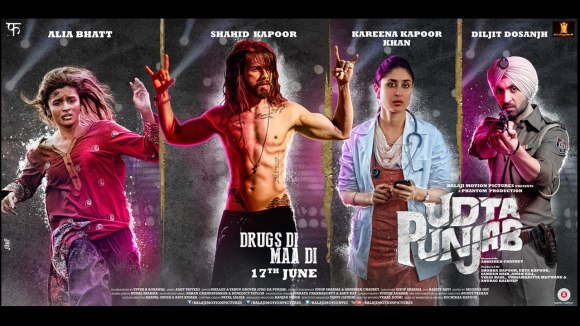
Dir. Abhishek Chaubey
Shahid Kapoor, Kareena Kapoor, Alia Bhatt, Diljit Dosanjh
I remember Lord Varys’ chat with Tyrion where he says –
Power resides where men believe it resides. No more and no less…[] ..A shadow on the wall ..[] ..yet shadows can kill. And ofttimes a very small man can cast a very large shadow.
So when Censor Board decided to make those cuts to the movie, it elevated the movie to a status of power, because they definitely believed that the movie shall make an impact or wield power on the current situation in some passive way; and in the process to do so, it both elevated the movie a higher status, with a measure of publicity that would never been a fraction of what it has today, while at the same time did endorse the message the movie might want to make despite trying not to do so. And is it worth it ? It is. By full measure.
Coming on to the film, the film highlights the deteriorating condition of Punjab through 4 characters (all brilliantly cast) – Tommy Singh (a.k.a The Gabru – a drug addict pop-star), the unnamed Bihari farm worker (Alia Bhatt – who spirals down the drug route and forced prostitution by a single mistake of greed – it’s interesting to note that the narrative keeps her nameless – like most cases of abuse, and people who are the worst affected actually remain unknown), Sartaj Singh (Diljit Dosanjh – a cop that vows a fight against drugs after his own brother gets affected) and Preet (Kareena Kapoor as a drug rehab clinic doctor).
The music, dresses, the vocabulary and the antics (Shahid Kapoor is as eccentric as a pop star can get, and the jail scenes are quite intriguing – the realism of the confession of the two convicts borders on being comic – reflective of the insane grimness of the situation in Punjab, the scale of which borders on being laughably stupid; Satish Kaushik fits perfectly as the profane but homely producer) are nearly perfect – one can only imagine how a pop star shall feel being (unwantingly, or rather unknowingly) a role model to the youth, being clueless himself.
Preet and Sartaj form a journalistic/buddy cop duo, slowly building up on the clues for a takedown of the enormous drug mafia (a situation, which logically makes it clear that can’t exist without a proper system that ensures a continual supply of drugs and druggies), and in the process, fall in love, probably because that’s one of the tested ways to involve the otherwise somewhat apathetic audience into a narrative that relies on letting you know the stakes of the drug abuse problem. An effective but somewhat a little bit too convenient way.
The film leniently borrows from well known films in drug culture, from the celebration of youth and ruthlessness in Trainspotting, to the disproportionate hell the characters are forced upon simply by even a mild influence of drugs; but Udta Punjab ultimately develops their visual metaphors for a more humane and desi touch, going a step ahead. Consider the Trainspotting toilet/underwater scene and Alia’s drop down the well, where she herself had dropped the drugs she accidentally scored – Alia’s character has to be under the effects because that’s only escape, the only guiding light she has while she faces sexual abuse and torture – to sustain her sanity, overlooking at the Goa tourism ad, dreaming of a beautiful future. But by the end, when she has somewhat secured the future, free of drugs – she dives in again, this time in a sea – a beautiful life is all the light one needs.
The film still takes a relatively optimistic stand on the situation – despite the intense profanity, implied torture and the gore (which doesn’t feel even a bit misplaced) – there is now way you can take a stand on a dirty situation without getting your hands dirty. The Censor’s decisions to an extent support the claims the film makers make, of a perfect cycle of drugs (bad films) and druggies (a helpless audience); and the fact that those who inherently seem are on the correct side of the law (only legally) meet a deserving end (of death, or being irrelevant and overruled), those on the fringe of the law but on a better moral ground shall save the future (rehab – for others, and themselves).
3.5/4
